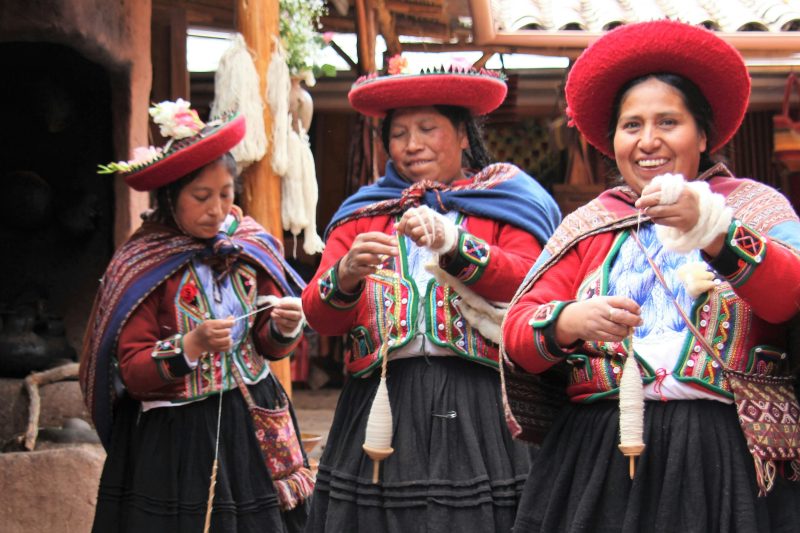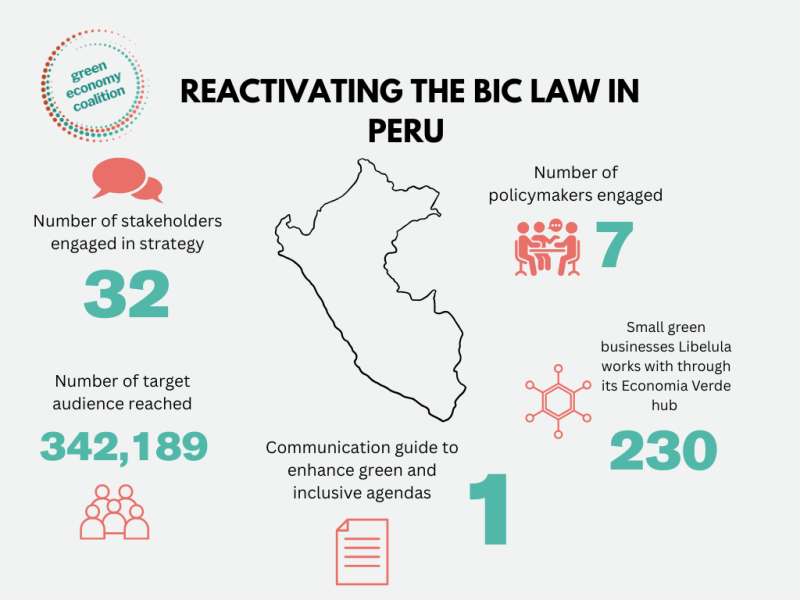Bring back BIC – a new lease of life for the BIC Law in Peru
GEC members, Libélula, brought renewed energy to push forward a green government initiative in Peru through a new communications strategy

In collaboration with our partners Development Alternatives (DA) in India, Libélula in Peru and ACODE in Uganda, in 2024 the Green Economy Coalition delved deep into audience and narrative research to support the transition to a just, green and circular economy. Over 8 months, the three local hubs brought together separate stakeholder coalitions to identify critical audiences – all with the aim of promoting inclusive green economies.
In Peru, GEC hub member Libélula consulted stakeholders to identify target audiences for a campaign to unlock the capability of social enterprises to catalyse inclusive green and circular economic transition. The project engaged audiences on social media platforms and connected Libélula to the relevant policymakers in Government, who welcomed support and renewed energy to push forward a green government initiative. Outreach and awareness building were achieved through robust design of a communications strategy, that had clear channels of communication and a detailed implementation and execution plan.
A legal milestone, but who knows about it?
Libélula had an existing legislative foundation in mind when designing their communication strategy, in the form of the collective benefit enterprises (BIC Law) which was introduced in Peru in 2021 – partly as a result of Libelula’s campaigning. This law enables consumers to identify green enterprises that generate positive social and environmental value via a certification / categorisation scheme, thus supporting green social enterprise.
However, by 2024 the new law had encountered some difficulties, including lack of understanding and only tentative support from the new administration. Libélula sought to reactivate the legislation by increasing visibility and outreach efforts among entrepreneurs. The target audiences identified include networkers who are able to reach large numbers of entrepreneurs, traction companies who can influence smaller businesses in their value chains and young entrepreneurs with an interest in impact-driven initiatives. The University of Lima was a part of the stakeholder cohort and assisted enterprises with applications for BIC status.
“ Dealing with political bodies involves working to set timetables and finding the right moments to achieve consensus on prioritising green agendas. This reinforces the need for adaptability by bringing in other stakeholders to create coalitions and alliances when governments are unresponsive”
The BIC Law represented a key milestone in the green space in Peru, recognising the importance of highlighting green enterprises and allowing entrepreneurs to see green credentials. However, lack of major outreach programmes meant that uptake remained low, with only 45 social enterprises registered with BIC. Through Libélula’s communication strategy, they sought to identify the drawbacks and barriers to current processes and develop communications tools that could benefit the initiative. Working with members of the Innovation Department and Ministry of Production as key influencers, they decided to prioritise raising awareness among businesses about the benefits of BIC, as well as designing strategies to overcome the governments lack of resources to execute a campaign of their own.
The communication channels identified to maximise reach included the government website landing page, allies such as networkers promoting the programme, social media platforms and information events. The first step was to develop the communications materials to improve outreach, followed by revitalising the government’s website to make it more engaging for users and ensuring the benefits of BIC were made clear. Finally, outreach efforts were made to raise awareness, share information and encourage sign up.
Room for improvement but overall, a positive verdict
Libélula’s campaign was catapulted by their strong social media community and audience base. They currently work with 230 small green businesses through their Economia Verde hub. Through using a wide range of social media tools, they encouraged their supporters to access the Ministry of Production’s home page to access information on the BIC initiative. From this, 4,000 potential SMEs (small and medium-sized enterprises) clicked through, showing keen interest in finding out more information on how to become BIC registered and increasing interest in the scheme.
Libélula also reflected that widening the scope of stakeholders and audiences at different points of the project would have created an alliance for communication that extended reach. For example, there was interest from the private sector in working with the government - exploring this avenue could have bolstered influence and created other pathways to progress. Like other hubs, Libélula found the stakeholder mapping exercise valuable, particularly if approached in an iterative way, and will be incorporating it into future work. The selection of the target audience was more complex, and consideration needed to be made about who would be most influential and have the capacity and readiness to deliver change.

The timeframe of this project created some restrictions in scope and longevity. More time for adaptive capacity would have allowed an iterative process where efforts could be rearranged and opportunities explored. More time to disseminate outputs and follow through with implementation would have allowed for better focus on long-term systemic change. These insights will help to influence future programmatic work.
The change of government after the BIC law was passed and the political instability since has impacted the efficacy of the initiative and the level of resource and priority it is given by departments. Dealing with political bodies involves working to set timetables and finding the right moments to achieve consensus on prioritising green agendas. This reinforces the need for adaptability by bringing in other stakeholders to create coalitions and alliances when governments are unresponsive.
Bringing diverse voices into the mix might help to progress the movement without government support. Interestingly, in tumultuous times hubs have found it easier to operate at a local level, where individual to individual relationships and influence is more accessible and tangible. Overall, however, Libelula’s efforts were welcomed by the Peruvian government and helped to give a new lease of life to the BIC law, raising awareness and promoting its benefits. The social media campaign has expanded reach to far greater numbers than before and paves the way for more successful future green initiatives in Peru.
- Zaiza Khan, GEC


